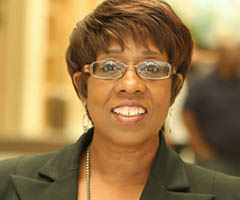Linda Medcalf
Linda's Story
After working a long day and attending a Good Friday service at her church Easter weekend, 1999, Linda Medcalf got home ahead of her family. Shedding her clothes, she rubbed the side of her left breast and felt a lump. She had never had cysts and had a normal mammogram 18 months before. Sitting on her bed, she felt God telling her the lump was significant, and it was important to act immediately.
Monday, she saw her primary care physician who scheduled a mammogram and ultrasound for that Wednesday; within 10 days, Linda was seeing a physician who was both an oncologist and surgeon.
Her life as a normal, active 47-year-old wife and mother of three, with two in high school and one in middle school, who also was working full-time, was about to change forever.
The Diagnosis
Linda was diagnosed with a fast-growing invasive ductal breast tumor and lobular breast cancer in April 1999.
Clinical Trials
She has taken part in two clinical trails.
The first involved sentinel lymph node biopsy (mapping), a surgical procedure that in 1999 was still in clinical trial but today, is often routinely used in staging (determining the spread of) breast cancer. This procedure allowed Linda's surgeon to preview the spread of the cancer in her body, and opt to surgically remove fewer lymph nodes. Limiting the number lymph nodes removed vastly improved her quality of life, and reduced the potential of side effects, including lymphedema.
Following multiple surgeries which revealed two kinds of aggressive cancers growing in the same breast, and mastectomy with breast reconstruction, Linda underwent chemotherapy as a participant in a phase III clinical trial.
The trial, which involved three combinations of chemotherapy drugs, was designed to determine the best drug treatment schedule for women with positive axillary lymph nodes. The goal: Improving long-term survival rates.
The results provided significant data including improved outcomes for disease-free survival rates and information for younger pre-menopausal women.
"Initially, I knew nothing about clinical trials and like most people was very skeptical at the thought of being ‘an experiment,' " Linda says. "It was more than enough to deal with the "Big C" cancer diagnosis.
"But when my oncologist suggested that I consider participation in the trial as an opportunity for an extension of my treatment options and explained that I would be monitored by a broad base professional collaboration team, long-term follow up, and no less the same best drug treatment, I decided to at least read the informational materials.
"All that technical data at first was overwhelming, but it engaged my mind and took the focus off my emotions. I realized that I was entering a fight for my life and needed to know all my options to win.
"Knowledge is power...the information helped me to become a part of my treatment team in a whole new way."
Life Now
"By the grace of God and the quality care I received, today I am a disease-free survivor with an excellent quality of life,” Linda says.
With her 20th disease-free year on the horizon, life is rich.
She's a community activist focused on cancer awareness and the importance of clinical trials, and works full time as an administrative assistant for a medical group.
She volunteers weekly with a women's prayer ministry at an area jail.
"I enjoy every moment of this life to the fullest, and I am looking forward to living an even better eternal life.
"Our battle against cancer is vast and ongoing," Linda says.
"I believe we all have a responsibility to contribute in this fight. Our shared efforts and knowledge are powerful -- working together, benefiting us all now -- our children and our future generations."

Linda Medcalf
Breast Cancer

